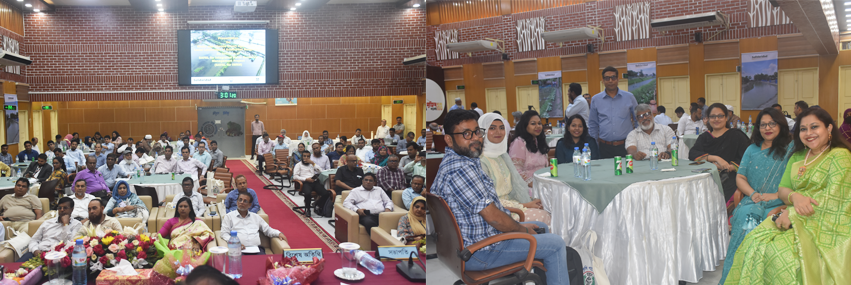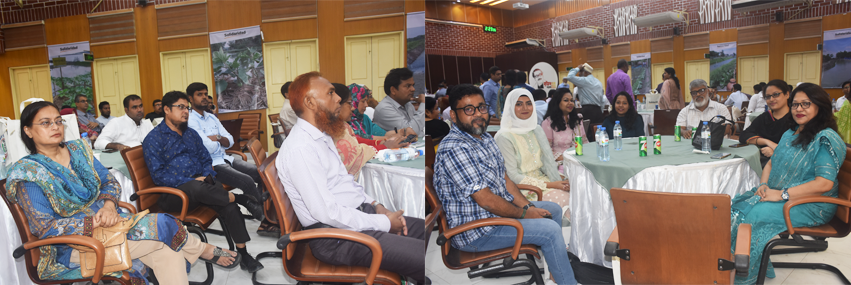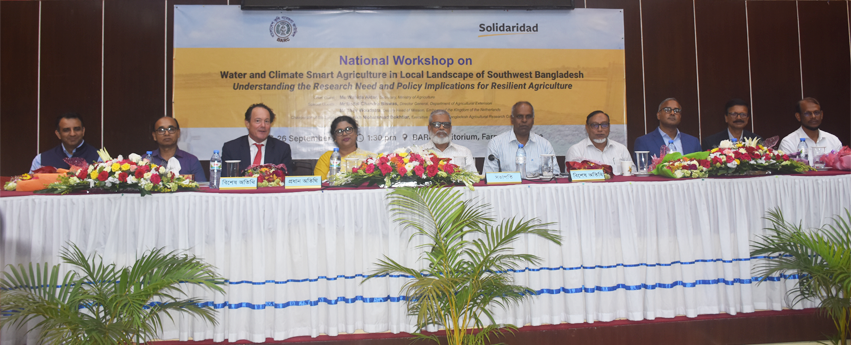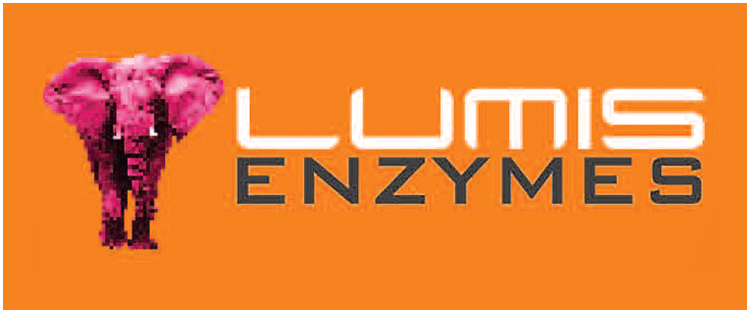
Agrilife24.com: Solidaridad Network Asia and Bangladesh Agricultural Research Council (BARC) have jointly organised a workshop titled “Water and Climate Smart Agriculture in Local Landscape of Southwest Bangladesh – Understanding the Research Need and Policy Implications for Resilient Agriculture” at the BARC Auditorium on 26 September, 2023.
The workshop mobilized relevant public and private sector stakeholders under one roof to bring about the deliberations on broader and emerging climatic issues in the southern Bangladesh, community level water management models, climate smart agriculture and its way forward, including ongoing research works and possible innovations. In addition, the workshop captivated inspiring climate financing models to the stakeholders to consider on scaling up the interventions.
Graced by the honourable Secretary of the Ministry of Agriculture, Ms. Wahida Akter as Chief Guest, and chaired by honourable chairman of BARC Dr. Shaikh Mohammad Bokhtiar, the workshop held panel discussions to gather insights from representatives of international private sectors, research and government agencies and civil society organization.
Special Guest, Mr Thijs Woudstra, Deputy Head of Mission, Embassy of the Kingdom of the Netherlands, stressed on Dutch government aid to trade agenda in Bangladesh. He mentioned that the embassy will invest and collaborate for lasting trade relationship in between Bangladesh and the Netherlands in improving security and water safety for people and improving ecosystems for productive agriculture, developing inclusive service delivery and empowerment of women for to influence decision-making for water management and climate smart agriculture, promote partnerships for technology and knowledge transfer for climate smart agriculture and ecosystem based farming, and in facilitating trade and investment for boosting the economic growth.

Mr. Selim Reza Hasan, Country Manager of Solidaridad Bangladesh stated about the potential contribution of each of the participants in the table as researcher, private sector and government authorities to promote climate smart agriculture in the context of integrated water resource management. Mr. Hasan mentioned that Solidaridad has extended its partnerships to stakeholders to make the agricultural practices more sustainable in terms of the use of water and soil and develop conducive environment for businesses to invest in the agriculture sector. He added that the partnership with BARC will expedite the expansion of these effort on supporting the community based micro-watershed management to help farmers enhance the production of agricultural goods. Solidaridad is forming a multistakeholder platform and requested the Department of Agriculture (DAE), Ministry of agriculture to steer the forum and foster climate smart agriculture in the Southwest Landscape.
The panel discussion outlined the needs and solutions for blending the goodness of water use efficiency through promoting integrated water resource management and climate smart agriculture to redraw the southwest landscape of Bangladesh. Mr. Mostofa Kamal, Country Director of East West Seed in Bangladesh, Nitin Rao, Head of Planning innovation of Solidaridad Network Asia, Mr. Dr Harunur Rashid, Chief Scientific Officer, OFRD, BARI, Khulna and Dr Md Abdul Muyeed Ex-DG, DAE And Senior Consultant, CIMMYT participated as panel discussant in the event.

The Chief Guest of the event, honourable Secretary of the Ministry of Agriculture, Ms. Wahida Akter in her speech, urged to take climate adaptation programmes not just limiting them to the surface of the issure, rather, like Solidaridad, conduct in-depth analysis of the problem and address with a holistic approach. She appreciated the efforts of Solidaridad in mitigating climatic challenges in the coastal region of Bangladesh and encouraged to continue and expand the efforts. She also emphasised on research and innovations on climate smart agriculture to enhance productivity. He requested all the research, extension and other government agencies under ministry of agriculture to support the initiatives of Solidaridad in promoting water bodies management and climate smart agriculture.

The Chair of the event Dr. Shaikh Mohammad Bokhtiar concluded by highlighting the importance of adopting and scaling the IWRM model to make water resource available for agriculture in the Southwest Bangladesh. He thanked the government of Netherlands for funding such innovative projects on IWRM and climate smart agriculture suitable for salinity induced coastal area of Bangladesh and assured that BARC will support the initiatives in terms of research and innovation and will coordinate with other government agencies to support the scaling of successful innovative technologies.
The Southwestern coastal zone has a tremendous potential to create opportunities of national importance through transforming agriculture and improving livelihoods by efficiently utilising resources. Managing the regions abundant water resources, both at a large infrastructure level and at a sub-catchment level through community-based water resource management aligned with the fragile land, is crucial to long-term development.
Solidaridad is implementing SaFaL for Integrated Water Resource Management (SaFaL for IWRM) project to improve productivity and income of 90,000 smallholder farming households and enhance the efficiency in using waterbodies for resilience agriculture in southwest Bangladesh covering the districts of Jashore, Narail, Satkhira, Khulna, and Bagerhat.
The goal of the project is to ensure sustainable use, protection and restoration of watersheds for resilient agriculture in Southwest Bangladesh, The project will support the population of southwest Bangladesh to benefit from improved micro-watershed management, increase in leadership position occupied by women in water committees, enhance the value of private actors’ investments in sustainable smallholder agriculture, and improve the condition of current governance context in support of community-based micro-watershed management.





















